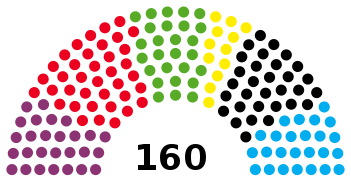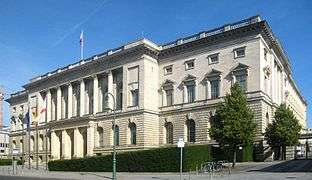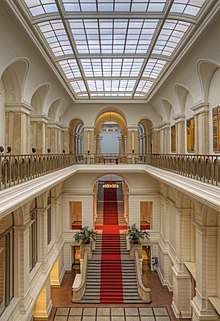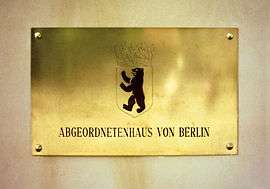Abgeordnetenhaus of Berlin
The Abgeordnetenhaus of Berlin (House of Representatives) (German: [ˈʔapɡəʔɔʁdnətn̩ˌhaʊs]) is the state parliament (Landtag) of Berlin, Germany according to the city-state's constitution. In 1993 the parliament moved from Rathaus Schöneberg to its present house on Niederkirchnerstraße in Mitte, which until 1934 was the seat of the Prussian Landtag. The current president of the parliament is Ralf Wieland (SPD).
Abgeordnetenhaus von Berlin | |
|---|---|
| Type | |
| Type | |
| Established | 1809 |
| Leadership | |
President | |
| Structure | |
| Seats | 160 |
 | |
Political groups | Government (92)
Opposition Parties (68)
|
| Elections | |
Last election | 18 September 2016 |
Next election | 2021 |
| Meeting place | |
 | |
| Preußischer Landtag building | |
| Website | |
| abgeordnetenhaus.de | |
History

The Abgeordnetenhaus was established by the new constitution of West Berlin in 1951. It replaced the former city legislature called Stadtverordnetenversammlung (city deputies assembly), established by the Prussian Reforms in 1808 and re-established by Allied-initiated state elections of 1946.
Between 1951 and 1990 the Abgeordnetenhaus was a parliament of restricted autonomy, since the Allied Control Council required that all its legislation and its elections, such as those of mayors and the senators (then still elected and not yet appointed by the mayor), be subject to Western Allied confirmation or rejection. After reunification the Abgeordnetenhaus continued to be the parliament of united Berlin.
Elections
The parliament of Berlin is chosen every five years in a general, free, secret and direct ballot according to the principle of proportional representation. It consists of at least 130 representatives, 78 chosen directly in the electoral districts of the Berlin boroughs, and 52 indirectly from land or district lists. If a party wins more constituency seats than its overall share of the vote, the overall size of the Abgeordnetenhaus increases because of these overhang mandates.
The current distribution of seats as of the 2016 election (compared to the 2011 election) is:
- Social Democratic Party (SPD): 38 seats (-10)
- Christian Democratic Union (CDU): 31 seats (-8)
- Alliance '90/The Greens: 27 seats (-3)
- The Left: 27 seats (+7)
- Alternative for Germany (AfD): 25 (+25)
- Free Democratic Party (FDP): 12 (+12)
- Pirate Party Berlin: 0 seats (-15)
The Pirate Party Berlin lost the 15 seats it won for the first time in the 2011 election due to their failure to cross the 5% election threshold necessary to qualify for representation in the 2016 election while the AfD joined the assembly for the first time and the FDP returned following a recovery in voter support.
Functions

The consideration and passing of legislation is the most important task, including the government budget. In addition, the parliament chooses the Governing Mayor of Berlin, and checks the city's government, the Senate of Berlin.
Presidents
| Name | Party | Period |
|---|---|---|
| Otto Suhr | SPD | 11 January 1951 – 11 January 1955 |
| Willy Brandt | SPD | 11 January 1955 – 2 October 1957 |
| Kurt Landsberg | SPD | 19 October 1957 – 4 March 1958 |
| Willy Henneberg | SPD | 20 March 1958 – 17 September 1961 |
| Otto Friedrich Bach | SPD | 29 September 1961 – 6 April 1967 |
| Walter Sickert | SPD | 6 April 1967 – 24 April 1975 |
| Peter Lorenz | CDU | 24 April 1975 – 10 December 1980 |
| Heinrich Lummer | CDU | 10 December 1980 – 11 June 1981 |
| Peter Rebsch | CDU | 11 June 1981 – 2 March 1989 |
| Jürgen Wohlrabe | CDU | 2 March 1989 – 11 January 1991 |
| Hanna-Renate Laurien | CDU | 11 January 1991 – 30 November 1995 |
| Herwig Haase | CDU | 30 November 1995 – 18 November 1999 |
| Reinhard Führer | CDU | 18 November 1999 – 29 November 2001 |
| Walter Momper | SPD | 29 November 2001 – 27 October 2011 |
| Ralf Wieland | SPD | since 27 October 2011 |
See also
- Timeline of Berlin
- Category:Members of the Abgeordnetenhaus of Berlin